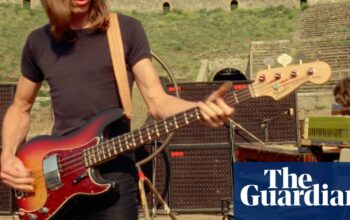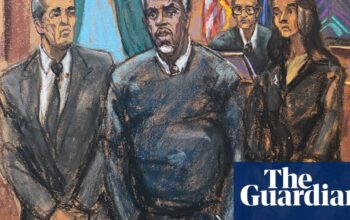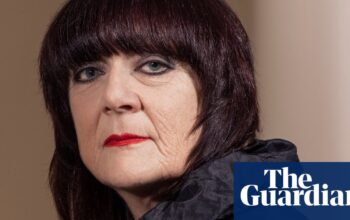W
Shirley Thompson always brings a CD of her original musical compositions with her wherever she goes. She has received both compliments and ridicule for her entrepreneurial spirit.
This routine proved useful when she engaged in a discussion with Prince Charles at Clarence House in March of last year. She was attending an event to honor her placement on The Powerlist, which recognizes the most influential Black individuals in the UK. “We were discussing music and he asked about the type of music I create,” Thompson remembers. “He then expressed interest in hearing my music someday, and I happened to have a CD of it in my bag.”
It can be assumed that Charles was pleased with what he heard. A year later, Thompson was selected as one of 12 musicians to create a composition for his coronation. Despite having decades of experience in composing music, this was a significant moment for her. She admits, “I tried not to let nerves get the best of me. While I treated it like any other commission, it was certainly not the same.” She also adds, “To prevent stage fright and allow my creativity to flow, I had to be courageous and bold in my approach.” This mindset seems to be a recurring theme throughout Thompson’s career, which began outside the traditional world of classical music and has now reached its highest levels.
Thompson, the eldest of four siblings, was born in 1958 in Newham, located in east London. Her parents had recently immigrated from Jamaica. Her mother was a district nurse in the intensive care unit, while her father worked as a forklift driver. Looking back, Thompson realizes that their childhood was idyllic, attending school during the week and going to church on weekends.
Although her parents were not involved in the arts industry, they strongly encouraged Thompson to have knowledge in this area. She was raised attending dance classes and learning tap and ballet. On Sundays, the house was filled with gospel, ska, and bluebeat music. However, Thompson did not start pursuing music until later on. It wasn’t until she was 11 years old that she began playing the violin, after a visiting teacher at her school noticed her talent.
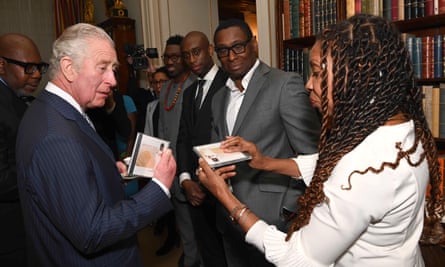
As a child, Thompson had various interests, which she sees as a good thing. “I was involved in music, but I also had many other hobbies,” she recalls. “Some people would say, ‘You’ll be a jack of all trades, but master of none.’ But I believed that I excelled in all of my interests.” In person, she is outgoing and self-assured, qualities that have been with her since she was young.
Many members of my orchestra began their musical journey at a young age, around four or five years old. However, I started much later and never imagined that I would pursue music since I was always playing catch up. It wasn’t until I was 14 or 15 years old that I first started playing the piano, but I had a natural talent that helped me overcome any challenges.
Participating in a youth orchestra was a significant aspect of Thompson’s adolescence. Unlike some of her peers who were coerced by their parents, she made the decision to join. She recalls, “That was my world, as I spent three days a week there. School was my usual routine, and orchestra was this interesting extracurricular activity. It must have been the pleasure I derived from it that motivated me to continue.”
Thompson’s formal music education and focus on composition and musicology expanded during her time at the University of Liverpool. Although she performed well in her studies, she became dissatisfied with the heavy emphasis on white, Western, and classical music. She had hoped to study a more diverse range of music, including African and global styles, but instead found herself studying Beethoven and Mozart within a Eurocentric syllabus. This experience left her feeling disheartened and caused her to become depressed.
Thompson shifted her attention to creating her own musical pieces. She jokingly remarks that it was an unusual activity for a student to do on the weekend. However, her hobby eventually led her to become a composer, while her peers spent their time at the pub.
Thompson acknowledges the significant impact of Black authors James Baldwin and Richard Wright on her work. She also credits a performance and lecture by musician and poet Gil Scott-Heron for inspiring her to combine music and activism. His discussion of liberation for Azania and South Africa influenced her approach to creating music. Scott-Heron’s influence was crucial in shaping Thompson’s creative mindset.
During her time at Goldsmiths University of London, the music she composed for her master’s thesis reflected her personal experiences and struggles. She was particularly inspired by the issue of police targeting young Black men, as she had witnessed her brothers and their friends being frequently stopped and searched. This led her to create a piece addressing this issue, which surprised her tutor upon hearing it.
Following her graduation, Thompson appeared to be making strides towards success. She was showcased on the BBC program Ebony (1982-1990), which highlighted the Black community in Britain, and was also featured in the 1985 edition of Radio Times. Additionally, she had her own string quartet. In 1990, her composition for the detective series South of the Border was chosen as one of the top 20 BBC TV themes. During a recording session at the BBC’s studio, the engineer noted that Thompson was the first female composer and conductor to work there.
However, Thompson encountered challenges with her compositions beyond her television work. Despite being able to present them through performances, they did not receive the desired reception. As a result, she did not receive reviews and subsequently, her opportunities for commissions dwindled.
According to her, critics intentionally ignored her performances, possibly due to her unconventional compositions. She believes this was a personal decision made by a small group within the classical music industry. They likely wanted to control who they promoted and she did not fit their criteria.
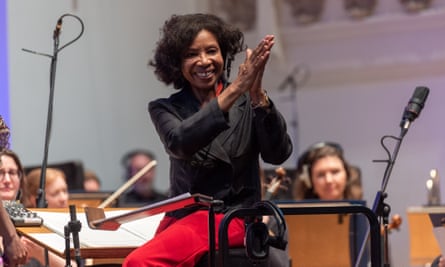
Excluded from the traditional music industry, Thompson chose to pursue a job in television, serving as a researcher and director for approximately 15 years. She also worked as a freelancer for various production companies during this period. Despite her focus on television, Thompson continued to compose music. However, she struggled to have her works performed. Then, she was approached by a promoter to create an ensemble, which served as a turning point for her career. The group consisted of singers, dancers, visual artists, and solo instrumentalists, and they performed at London’s Southbank Centre.
In the 2000s, the effort she put into composing music began to pay off. She was asked to create a large-scale piece to honor the Queen’s Golden Jubilee in 2002: New Nation Rising, A 21st Century Symphony. This made her the first woman in Europe to both compose and lead a symphony in four decades. The symphony, which was later recorded by the Royal Philharmonic Orchestra with almost 200 performers, including a rapper and dhol drummers, paid tribute to London’s rich 1,000-year history. New Nation Rising was well-received at the time and is said to have influenced Danny Boyle’s renowned opening ceremony for the 2012 London Olympics. Thompson believes she was chosen for this prestigious task because her compositions, which drew inspiration from diverse musical genres like hip-hop, were unconventional compared to the norm. “I was writing in my own unique style, not using all of that heavily dissonant material.” However, she notes that she still faced rejection from the classical music establishment. “They wouldn’t even consider it. My music is relatable, but contemporary classical music values being abstract and inaccessible, and that is what earns you the title of a genius. If people can understand your work, it must not be good enough.”
In 2007, Thompson received an invitation from a parliamentary committee to create a significant work for the launch of an exhibition at the Palace of Westminster in London. The exhibition, titled “The British Slave Trade: Abolition, Parliament and People,” inspired Thompson to represent the triangular trade between Europe, Africa, and the Americas by selecting a woman from each continent.
The composition was inspired by three women: Queen Nanny of the Maroons, who fought against British colonizers in Jamaica during the 18th century, Dido Elizabeth Belle, a mixed-race woman born into slavery in England, and an unnamed enslaved woman who was killed on a slave ship in 1792 for standing up for herself. The composer portrayed these women as characters on stage, using the music to capture their personalities and provide psychological insight into their lives.
Thompson describes the response to the piece as “extraordinary” and it inspired her to create a follow-up series called “Heroines of Opera”. She explains, “I am still deeply affected by how this commission sparked the concept of honoring women of African descent.”
The high-profile tasks have persisted. In 2009, Thompson was hired by the South Bank Centre to compose a musical composition honoring the first 100 days of Barack Obama’s presidency, which was played by the BBC Concert Orchestra. Her Heroines of Opera series, influenced by her New Nation Rising: A 21st Century Symphony, is currently ongoing and evolving.
With Thompson’s background in music education during her school years and current position as head of composition and performance at the University of Westminster, she has strong views on the current state of arts education. This is particularly evident in her response to Prime Minister Rishi Sunak’s recent statement about cracking down on what he deems as “low-value” arts degrees. Thompson firmly disagrees with this perspective, stating, “It is a misconception to think that way. A well-rounded education provides opportunities. I find it difficult to comprehend how we can regress to a mindset from a thousand years ago and think in such a narrow-minded manner. Culture is essential to life. It is a necessity.”
Many young individuals who do not have a fascination with classical music may have been introduced to Thompson through her appearance on the mockumentary show Cunk on Earth last year. This show features comedian Diane Morgan as Philomena Cunk. In a serious manner, Cunk asked Thompson absurd questions like, “Did Beethoven have a real-life horse residing inside his face?” and “Is it accurate that Beethoven was deceased during the last years of his career?” Thompson responded to these inquiries with light-heartedness.
Her appearance on the show certainly raised eyebrows among her peers, “I had one of my professor friends saying to me: ‘What did you do that for?’” she says. “I did it because I thought it was a way of getting classical music out to people. The whole experience was certainly weird.” But doing things unconventionally is something Thompson feels has carried her career to where it is now. “Everything I’ve done [in music] has been quite avant-garde and radical, and out of the box really.”
Although Thompson has received prestigious commissions and many awards, such as an OBE for her contributions to music in 2019, she considers a simple request from her mother to be the most significant moment of her career.
Thompson recalls, “My mother accompanied me to all of my events, including when I composed my very first piece, Sempliche, during my school days. However, she never discussed the music itself, only focusing on the practical aspects.”
This composition was the initial piece I completed during my time as a student, while I was studying for my A-levels. It was written for flute, piano, and violin, and initially created simply for leisure during a weekend. However, it gained popularity at my academy and was even performed at a concert, receiving an incredible response. Nearly three decades later, my mother still remembered this piece, which deeply moved me.
Source: theguardian.com
